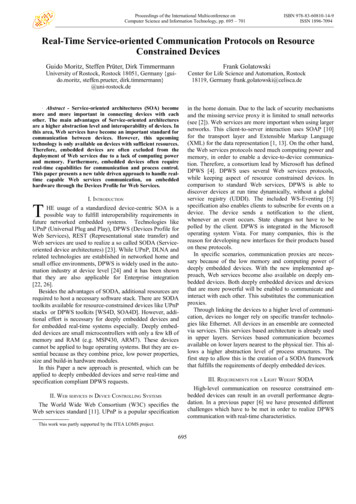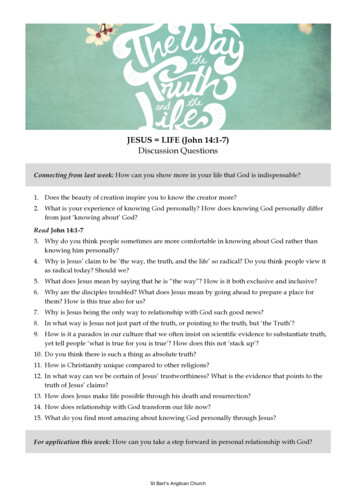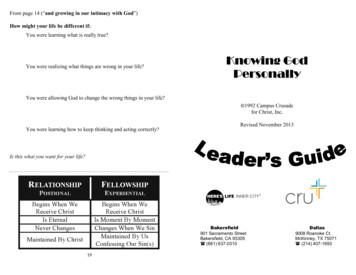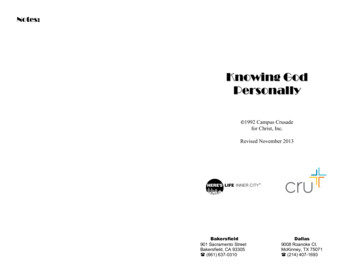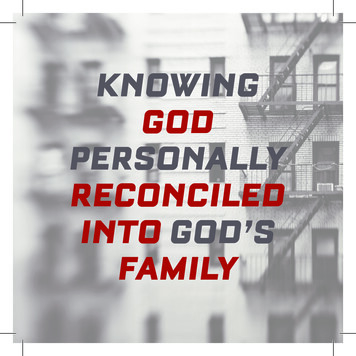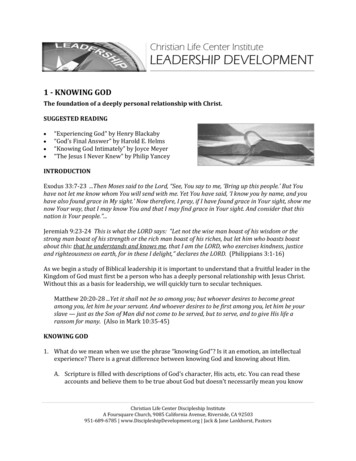
Transcription
How to personally, moredeeply encounter God by David Legge
ENCOUNTERING GODDavid LeggeDavid Legge is a Christian evangelist, preacher and Bibleteacher. He served as Assistant Pastor at Portadown BaptistChurch before receiving a call to the pastorate of the IronHall Assembly in Belfast, Northern Ireland. He ministeredas pastor-teacher of the Iron Hall from 1998-2008, andnow resides in Portadown with his wife Barbara, daughterLydia and son Noah.Contents1.2.3.4.5.6.7.The Cost of Discipleship - The Call To Encounter God - 3The Practice Of The Presence - The Atmosphere Of Encountering God – 14Pride vs Humility - The Condition Of Encountering God – 25How To Be Filled With The Spirit - The Energy Of Encountering God - 36Sins, Wounds And Demons - The Barriers To Encountering God - 48Gifts And Fruit - The Outcome Of Encountering God - 62Revival - A Community Encountering God - 73The audio for this series is available free of charge either on our website(www.preachtheword.com) or by request from info@preachtheword.comAll material by David Legge is copyrighted. However, these materials may be freely copied and distributed unaltered for thepurpose of study and teaching, so long as they are made available to others free of charge, and the copyright is included. Thisdoes not include hosting or broadcasting the materials on another website, however linking to the resources onpreachtheword.com is permitted. These materials may not, in any manner, be sold or used to solicit "donations" from others, normay they be included in anything you intend to copyright, sell, or offer for a fee. This copyright is exercised to keep thesematerials freely available to all.2
ENCOUNTERING GODDavid LeggeEncountering God - Chapter 1"The Cost of Discipleship - The CallTo Encounter God"Copyright 2013by David LeggeIwant you to turn with me, please, in your Bibles to Luke's Gospel chapter 14. Now,I am following the theme each night: 'Encountering God' - and tonight I want topreach on 'The Cost Of Discipleship', which is 'The Call To Encounter God'. The callto encounter God is the cost of discipleship - so, if you're here and perhaps the title ofthese meetings has intrigued you somewhat (and there's a lot of 'spiritual junkies'about, it has to be said, who will go from meeting to meeting trying to get somesupernatural experience). I do believe in the supernatural, as you'll find out this week,but there is a cost and a price to be paid to encounter God personally - and it is,initially, the cost of discipleship.We will consider that as we look at the words of our Lord, from verse 25 of Luke 14,and we'll be reading down to verse 33: "Now great multitudes went with Him. And Heturned and said to them, 'If anyone comes to Me and does not hate his father andmother, wife and children, brothers and sisters, yes, and his own life also, he cannotbe My disciple. And whoever does not bear his cross and come after Me cannot be Mydisciple. For which of you, intending to build a tower, does not sit down first and countthe cost, whether he has enough to finish it; lest, after he has laid the foundation, andis not able to finish, all who see it begin to mock him, saying, 'This man began to buildand was not able to finish'. Or what king, going to make war against another king,does not sit down first and consider whether he is able with ten thousand to meet himwho comes against him with twenty thousand? Or else, while the other is still a greatway off, he sends a delegation and asks conditions of peace. So likewise, whoever ofyou does not forsake all that he has cannot be My disciple'".Let us pray. I want you to do something as we bow our heads, I'm going to ask you todo this every night: I want you to pray for yourself, I want you to pray for yourselfnow, that God will speak to your heart. Would you do that please? I believe Godanswers that prayer when it's prayed in sincerity and truth. If you really want toencounter God just now, I want you to pray: 'Lord, speak to me'.Abba Father, we do come to You in the name that is above every name, Lord JesusChrist. We in this holy place, in this sanctified moment that has been set aside to focuson You - and in order to, as it were, Lord, draw near to God that He might draw nearto us - Lord, by faith we would invoke the very presence of Almighty God. We longnow, and ask in Jesus' name, that we will know that we are in the Divine Presence,Lord, that You would descend to us as the dew upon the tender herb, as the summerrain upon the freshly mown grass. Lord, come down, come into our midst, penetratethe atmosphere of this place. Come Holy Spirit, bring the presence of the Father andthe Son with You to us, to make their abode now. Lord, we want to encounter God.Lord, we want to meet You. We want to be delivered from a meeting, from goingthrough formalities. Lord, we want to know that God is here. Lord, none of us can work3
ENCOUNTERING GODDavid Leggeup Your presence, it must come down - and so, come Lord Jesus, come Holy Spirit. Weproclaim and declare the authority of the Lord Jesus Christ in this place. We proclaimthat He has overcome the enemy by the blood of the Lamb. We declare now what theblood of the Lamb means and what it does: and we take the victory and take ourstanding tonight against the enemy in Jesus' name. Lord, we now pray that You willrelease the power of Your Word tonight, that lives will be changed, disciples will bemade in the name of the Father, and of the Son, and of the Holy Spirit. For Christ'ssake we pray, Amen.I'm sure you're aware that we live in a celebrity culture. It seems to be the dream ofmany people - especially young people, it has to be said - to be famous, to have anentourage of fans and groupies fawning and fainting at your feet. But such fickle,superficial allegiance never would satisfy the Lord Jesus Christ. Here in verse 25 of ourreading, we see that multitudes, great multitudes, went after Jesus - but it appearsfrom the subsequent verses, that we read together and will meditate on tonight, thatthe Lord wanted to sift out from this crowd those who were really serious about Him,as opposed to those who were just curious or caught up in the mass excitement of themiracles. The Lord Jesus still has the same objective. The Lord Jesus is not interestedin quantity as much as quality.When preaching the Gospel I think we need to beware of two errors, two extremes.The first is: we can give the impression that people need to clean up their lives beforethey come to Jesus - and that, effectively, is a gospel of works, a gospel of the flesh.Sometimes, if we over-emphasize repentance at the expense of faith, we can fall intothis trap - we make people feel that they have to have everything cracked and solved,every sin gone before they come to the Lord Jesus. But the fact of the matter is, ourGospel is a Gospel of grace, and without the unmerited free favour of God, which is agift, we cannot do anything about our sin without the power of God. It is to those whoreceive Him, that He gives power to become sons and daughters. So, yes we've got tobe repentant and we've got to be willing, but it is God who empowers us to overcomesin. As we say here: we ought not to put the cart before the horse.In fact, in the previous parable that Jesus told in this very chapter He talks about agreat supper, and this man who invited friends to the feast. In verse 17, he says:'Come, for all things are now ready' - and that's the Gospel invitation. It's an invitationto all people, because Christ has finished the work, and all you've got to do is come. Infact, this man wants his house full of guests, just the way God wants heaven full ofrepentant sinners. So let's not make the mistake of implying to people that they haveto get their lives right before they come to Christ - and I hope that you haven't madethat mistake tonight. As Charlotte Elliott said:'Just as I am, without one plea,But that Thy blood was shed for me'.Yet a second error, a second extreme that we can very easily fall into is to give theimpression that Jesus wants us to stay the same. We can come to Jesus just as weare, but Jesus calls people not just to follow Him to Heaven, but to follow Him onEarth. You see we are instructed by Jesus not to go into all the world and makeconverts, we're told by Him in the Great Commission to make disciples, baptizing themin the name of the Father, the Son, and the Holy Spirit. You see, Jesus Christ wants totransform the whole person, and therefore the whole person has to embrace Christ and4
ENCOUNTERING GODDavid LeggeHis message.Let me try and simplify it by saying that it costs you nothing to become a Christian,but it ought to cost you everything to be a Christian. Can I repeat that? It costs younothing to become a Christian - by grace are you saved through faith - but it ought tocost you everything to be one, because to be a Christian ought to mean to be adisciple.A disciple is a follower. I mentioned the shipyard, and some of you may have beenapprentices at the shipyard, or maybe you were an apprentice at joinery or plumbingor some other trade - and an 'apprentice' is the same word, effectively, as a 'disciple',it has the same meaning. What an apprentice does is, as a young lad, maybe 14 or 15,he comes alongside a more experienced tradesman - and initially all that he does is, hewatches. He looks and he learns from how the old man does it. Then eventually he hasa go himself, and in a controlled environment the old man supervises him as he has ago. Maybe he makes a couple of blunders, and maybe he hits his thumb and all therest - you know about it - but that's the only way that that apprentice can learn. Thatis what a disciple does - it says in Mark chapter 1 that Jesus called His disciples to bewith Him, and then He sent them out to do His work.He calls us to be with Him, to observe, and to learn - and that requires commitment. Itrequires commitment to be Christ's disciple. You see, Jesus wants to clean up your life,Jesus wants to cooperate with you - and you've got to be willing, you've got to berepentant, you've got to be involved in this process! It's not enough to come to Jesusas you are, get your sins forgiven, and think: 'Well, that's it!'. If you think of your lifelike a house, when you give your life to Jesus, Jesus doesn't expect you to renovate itbefore you give it to Him to clean it from the inside out - He just wants you to give itto Him the way it is. But when you give the house that is your life to Christ, you've gotto be prepared for Him to make some changes. He wants to tear down walls, He wantsto rebuild, He wants to fix broken things - because being a disciple means wecooperate with Jesus in the work the He wants to do in us. Maybe you're here tonight,and you've been a believer for many years, and you, in fact, have been resisting thework of Jesus. You've been reverting back, perhaps, to your old ways. You may walkon the clean side of the road, you may be moralistic and fine upstanding in yourcommunity - but, as far as going on with God is concerned, you're static, you're stuck!Jesus is so candid, isn't He? He tells it like it is. He wants us under no illusions of whatit will mean to encounter God. The call to encounter God is to be a disciple of Jesus.There was once a recruitment Sergeant Major in the United States Army, just aroundthe Vietnam war, and there was a crowd of young lads who were at a street cornerhanging about doing nothing. He came up to them, he was in uniform with all hisregalia, he had his ribbons and his medals on his breast. He came up to those younglads, and he said: 'Do you want to serve your country?'. They said: 'Of course!'. Hetold them the great glory stories of war and honour and heroism, and of course they allsigned up. A number of months later they were lying in the paddy fields, bombs goingoff around them, their comrades being blown to smithereens - and one turned to theother and said: 'The recruitment Sergeant Major didn't tell us about this!'. Jesus is notlike that. When He gives His call to us to be forgiven, to be born again, it is free ofcharge - but He wants us to understand what we are being called to. At times the LordJesus wooed crowds to Himself, but then He began to winnow them. He uses thisstrong language to thin out the ranks, and He wants us under no illusion that it costs5
ENCOUNTERING GODDavid Leggeto be a committed follower of Christ, it costs to encounter God - and you need to countthe costs!Let me herald that call tonight right at the beginning of this week: don't you thinkyou're on a supernatural rollercoaster to eternity this week, of being touched by thesupernatural and the miraculous without any cost. So Jesus, in three ways, tells us thecost of discipleship - and I want to bring it to you tonight under three headings. First ofall: there is a crisis of love. Then: we are to carry our cross. Thirdly and finally: we areto count the cost of following Christ. The first is found in verse 26, the crisis of love,look at it, verse 26: 'If anyone comes to Me', Jesus says, 'and does not hate his fatherand mother, wife and children, brothers and sisters, yes, and his own life also, hecannot' - that's an emphatic term - 'he cannot be My disciple'.Now I hope you ask questions of the Scripture, I don't mean in a cynical, doubtful way- but we learn by asking questions, and right away something ought to flag up in yourconsciousness. There seems to be an apparent contradiction here: Jesus, it appears, isinstructing us to hate. 'Hate father and mother, wife and children, brothers and sisters,and yourself' - yet the Ten Commandments, given to Moses by God, says what? Thehardest one of them all probably: 'Honour your father and your mother'. Is Jesuscontradicting the commandments? He says, 'If you don't hate father and mother youcan't be My disciples'. Is Jesus contradicting Himself? He's the one who came and said:'I haven't come to destroy the law, but to fulfil it', and He said 'Love one another', Hesaid 'Love your neighbour', and He even went as far as saying 'Love your enemy' - andeven if your Mum and Dad are your enemies here tonight, you still have to love them!Is Jesus contradicting Himself? Well, let me say, if you 'hate' your mother and fatherthe way Jesus 'hated' His mother, Mary, you'll be doing well. You remember when Hewas hanging on the cross, He said to the apostle John: 'Behold, your mother', He saidto His mother, Mary, 'Behold, your son' - and from that day, John took Mary, themother of Jesus, into his own home and looked after her as his own mother. So theLord Jesus obviously loved His mother, Mary. So what is He saying? He's usingexaggeration to emphasise a truth. He is really saying that all other loves in our livesmust be like hate in comparison to our love for Jesus. Do you understand? He'sexaggerating to make us realise that Jesus must be the pre-eminent love if we aregoing to be His disciples.In another place, in Matthew 10:37, He put it like this: 'He who loves father or mothermore than Me is not worthy of Me. And he who loves son or daughter more than Me isnot worthy of Me' - so He's inferring that we will love father and mother, son anddaughter, but the point He's making is that our love for them must be like hatred incomparison to our all-consuming love for Christ. It's very simple, and yet so deep, soprofound, that most of us miss it: to be a disciple of Jesus you have to love Jesussupremely. Or alternatively, we must not love others or ourselves at the expense ofloving Him. Have you had this crisis of love tonight? Is Jesus Christ not only Lord of all,but is He your love of all? I know that's probably an impossibility, perfectly andcompletely for all of us, but let me ask another question: are you at least aware of thatas the cost of discipleship? Are you aware of that crisis in your life where you'rewanting your love for Jesus to be right at the apex of your life, top above all?C.T. Studd, the great pioneer missionary, was afraid that his fiancee might love himmore than she loved to Jesus, so he wrote a poem that she ought to repeat herselfevery day. It went like this:6
ENCOUNTERING GODDavid Legge'Jesus, I love Thee,Thou art to meDearer than CharlieEver could be!'.The point bears emphasis - like Ruskin the poet, who proposed to a Christian lady, andshe asked him: 'Do you love me more than you love Jesus Christ?'. He had to admitthat he did, and she said: 'Well, in that case, I couldn't marry you'. Ruskin tried againeven after she contracted a serious illness, and her answer was still the same. Shedied not long afterward, but Jesus was still first in her life. Now you might say: 'Boy,this is really extreme stuff here this evening!'. I vouch to say - and I know your Pastorwould be faithful in preaching this - but this isn't a popular message, this is not themessage to draw in the crowds! This is the message to thin them down, this is themessage that sends people packing! People left Jesus Christ because He preached thismessage - but there must be a crisis of love if we're going to encounter God! It is thecall of discipleship.There could be a disordered love in your life tonight - what does that mean? Your spiritthat is meant to bow down in worship of God is bowing down to another love. It couldbe a sinful love, but it may not be. It may not be inherently immoral. It might be achurch, it might be a doctrine, or a basis of belief, or a theological persuasion, or itmight be a religious practice - or it might be a member of your family, it might be yourhusband or your wife, or your son or your daughter, or your brother or your sister, oryourself. We're talking about disordered love, which effectively is idolatry, when ourspirits bow before them and they come before the Lord God. 'You shall have no othergods before Me', one. 'You shall not make unto you any graven image and bow downto it', two.Maybe this crisis of love is because you're looking for love and meaning somewhereelse. Jesus is not saying we ought not to love our husbands and wives, and ourchildren, He's not even saying we ought to hate ourselves. We ought to have a certainself-esteem and respect, no one should hate themselves - but we ought not to look toother loves for meaning and self-worth. Some of you husbands are looking to yourwives for meaning, and vice versa. Some of you are looking to your children - and thisis often the evangelical sin. We don't maybe go to the clubs and pubs, we're notinvolved in drug abuse and promiscuity and sexual looseness, but some of us are livingand worshipping for our families or our careers! That's why we're not encounteringGod! We wonder what's wrong, we wonder why the heavens are brass, we wonder whywe're not getting through to God, and God doesn't speak to us the way He speaks toothers - but we are looking to other things, other loves for meaning.What is Jesus saying here? Listen: 'If you want to encounter God, if you want to be Mydisciple, you've got to be aggressively violent with every heart tie that keeps you fromloving Christ above all'. The worst love of all He mentions last, self - that instinct ofself-preservation. Instead of living self-centred lives, we are meant to live Christcentred lives. Instead of asking the question, 'How every action will affect me?', Weought to be asking, 'How will this affect Christ, His glory, and the extension of Hiskingdom?'. You say: 'Boy, I came here to get a touch from God! You're so negative!'.I'm not negative, this is not being negative, this is how we know the fullness of Christin our lives! You see, whenever you realise the love of Jesus for you, Paul said: 'We7
ENCOUNTERING GODDavid Leggelove Him, because He first loved us, and gave Himself for us'. Whenever you know theall-encompassing love of God - that's what Paul prayed for the Ephesians, that theywould know the four-dimensional love; the height, the length, the depth, the breadthof this eternal love. In fact the Bible says Christians are going to spend all eternity justopening up all the different layers of this glorious love, it's inexhaustible! You see,when you get a touch of that, you realise that Jesus can make such audacious claimslike this because it's motivated by love, it's motivated by love:'When I survey the wondrous CrossOn which the young Prince of Glory died,My richest gain I count but loss,And pour content on all my pride.Were the whole realm of nature mine,That were an offering far too small;Love so amazing, so Divine,Demands my soul, my life, my all'.Napoleon Bonaparte understood this principle, he said: 'I know men, and I tell you thatJesus Christ is no mere man. Between Him and every other person in the world, thereis no possible term of comparison. Alexander the Great, Caesar, Charlemagne, and Ihave founded empires - but on what did we rest the creations of our genius? Uponforce! Jesus Christ founded His empire upon love, and this hour millions of men woulddie for Him'. Is there a crisis of love in your life? Do you want to be His disciple andencounter God? I'm not saying I love Jesus more than my wife, or my children, but Iknow I need to and I know I want to! Wait till I tell you this: I know I will love themmore and better, if I do love Him over them.A crisis of love, the second thing Jesus says is: to be His disciple, you've got to carryyour cross. Verse 27: 'Whoever does not bear his cross and come after Me cannot',there it's emphatic again, 'cannot be My disciple'. Now there are two errors here thatpeople fall into - the first is that they think they have to carry the cross. You see thistragically, particularly in parts of South America and the Philippines, some dearmisguided Roman Catholic people who are dying on crosses, or at least mortifyingthemselves and flagellating themselves on crosses, because they believe they have tostill pay something for their sins, penance. Jesus cried from the cross: 'It is finished!'.You don't have to pay anything for your sins to be forgiven, the blood of Jesus Christ,God's Son, has been shed and cleanses us from all sin. You don't have to bear thecross, your sins can be forgiven by receiving it by simple faith. Others make themistake of thinking: 'Well, this cross is some kind of physical or mental infirmity that Ihave to bear in my life' - or maybe it's troublesome neighbours, or a nagging wife, or agrumpy husband - 'That's my cross to bear!', you hear people talking like that, don'tyou? That's not what the cross is here that you've got to bear. You see Jesus' cross,Jesus' cross, is what He suffered for righteousness' sake, and your cross is what youwill suffer for righteousness' sake also, for following Christ, for standing with Christ. Itwill be a pathway of reproach, of suffering, of loneliness, of perhaps even death - buthere is the whole point: it is voluntary! You must take up your cross, and you mustfollow Christ.This is not some illness inflicted on us, or circumstance or situation that we cannot getout of - this is something that we choose for love of Christ. Not all Christians bear their8
ENCOUNTERING GODDavid Leggecross, that's obvious. It is possible to avoid this by living a nominal inconsequential'Christian' life. You see, when you choose to encounter God, when you choose to goout and out for Jesus, you will experience something of what Jesus did. You willexperience ostracisation, you will experience suffering, rebuke, scorn, the oppositionand contradiction of sinners - and even satanic opposition, demonic opposition! Yousee, the disciple will need to follow the road of self-renunciation, of fiery temptation you thought that if you got to know God a bit better, temptation would just melt awaylike a snowball? I've got news for you: it gets worse, it gets worse. Humiliation and allsorts of opposition will come your way, but here's what I want you to understand: wechoose this. Jesus says: 'You've got to take up your cross' - identify with Christ, anddie to self, and suffer for Him - because crosses were made not to live on, they weremade to die on! Every morning you wake, if you're going to be a disciple of Christ, youneed to go and look in the mirror and say: 'Today you've been called to die to selfindulgence, self-interest, self-promotion. Die to the world, die to the devil, die to theflesh, and live unto God!'.So, have you taken up your cross? Have you? A missionary going into the virginterritory of a pioneer field noted that there was a van that preceded the missionarycaravans, and it was a van filled with coffins. It was their own coffins. They knew itwas more than likely that they would die on the field for their faith, and they literallywere taking up their cross and following Christ. You see, we have all this religiousregalia now, and terminology and language - and thank God for a lot of it - butsometimes it obscures the reality of these spiritual truths. What was a cross? It was aninstrument of execution. It was tantamount to Jesus saying to you tonight: 'Take upyour electric chair, and come and follow Me', 'Take up your hangman's noose, andcome and follow Me'.I hope you're getting this. He's saying: 'Come and walk on death row, and follow Me, ifyou want to be My disciple'. You say: 'You are making us miserable! You really are! Ifyou're trying to encourage us to go on with God tonight, you're not doing a good job ofit!'. Listen: this is the blessed life, this is the Christ life. Jesus said: 'You must lose yourlife to find it', and it is a heavenly life that we can even know down here - but you'vegot to be prepared to lay down the life here.Tom Landry was Coach of the Dallas Cowboys, and he once said: 'The job of thefootball coaches to make men do what they don't want to do, in order to achieve whatthey've always wanted to be'. To make men do what they don't want to do, in order toachieve what they've always wanted to be. Some of your like the lady that goes intothe fancy boutique - not that any of you ladies would be like this - and you see abeautiful garment, and you think: 'That's for me!', maybe a wedding or some kind offunction, 'That's mine! That's just right for me!'. You imagine it, and fantasise aboutyou wearing it, then after thinking about that for a while you then see this little bit ofcardboard, this elusive little thing that hangs on a bit of cord on the sleeve or the hemor something like that - you men know about that - and you just turn around, and thena quick intake of breath! Do you still want the garment? Of course you do! You stilldream about wearing it! Are you prepared to pay the price? Probably not!Oh, you want the blessed life, you want to encounter God. Oh, you want to go on withJesus, you want to know the supernatural, you want to live a life of daily miracles well, it isn't a life of daily miracles I'm afraid - but the call to encounter God is to paythe price.9
ENCOUNTERING GODDavid LeggeThe Cambridge Seven were students who left Cambridge University and went to themission field. They were radicals, I mean if you saw them today they would beradicals. They shaved their heads, and grew moustaches to look like Chinamen, anddressed up like Chinamen - that's radical in today's terms, let alone way back then.One of them was C.T. Studd, who I've already mentioned, and he gave away hisfortune - he had a great inheritance, and he was also a great cricket player. He gaveaway what's probably the equivalent of about a million pounds in sterling today. Hesigned it all away, some of it to the Salvation Army, some of it to George Mueller'shomes, and the rest of it to the China Inland Mission. He said: 'The stuff went!'. Hewent to China, and then he went to India where his father made his fortune, and hefelt he had a debt to India. Then he went to Africa, and he wrote some scorchingbooklets in Africa. One of them was called: 'The Jihad of Jesus' - what about that, eh?'The Jihad of Jesus', another was 'Christ's Etceteras', one that you can still get today is'The Chocolate Soldier', and in it he talks about heroism as the lost call of Christianity.He says: 'How can we become so hot for Christ that others will be scorched?'.Then there was another little booklet that he wrote called 'DCD' - have any of you everheard of that little booklet by C.T. Studd? 'DCD' - I'm sure you haven't, let me explainwhat it means. The WEC missionary organisation was split, there was coldness in theranks, there was backsliding among converts - some of them on the continent ofAfrica, and in the Congo in particular, were going back to witchcraft and drunkenness.Studd got his workers together and he said: 'What can we do? We need to do more tostir up these people!'. They were reading that morning in their study in Hebrews 11,you know that great Hall of Faith, and at every juncture where it said that some manor woman of God suffered for their faith, C.T. Studd banged the desk and he said:'There must be more that we can do! What more can we do?'. One was sawn asunder,it says, he smacked the desk: 'What can we do?'. There was a man at that meetingcalled Staniford, he happened to be a Sergeant Major in World War I, and he spoke upand told of how one day in the trenches they were surrounded by the Germans andthey knew there was no way out except up and over the top, and undoubtedly theywould all be killed to make room for the British troops coming from behind - you justjump over the top and take the risk. As those soldiers contemplated that great act,Staniford said one said: 'Boys, for King and for Country, let's go over the top - and ifwe die, we die, I don't give a d**n', (a word beginning with 'D' which I'll not say in thechurch tonight), 'If we die, we die, I don't give a d**n'.Now that upset a lot of people, that story, but C.T. Studd wrote a booklet, 'DCD','Don't Care a D**n' - yes, he did. That might not have been the right wording, but itwas the spirit that overcame the lethargy and the schism that was in the WEC. Itwasn't the right wording, but it was the
1. The Cost of Discipleship - The Call To Encounter God - 3 2. The Practice Of The Presence - The Atmosphere Of Encountering God – 14 3. Pride vs Humility - The Condition Of Encountering God – 25 4. How To Be Filled With The Spirit - The Energy Of Encountering God - 36 5. Sins, Wounds And Demons - The Barriers To Encountering God - 48 6.File Size: 748KB
